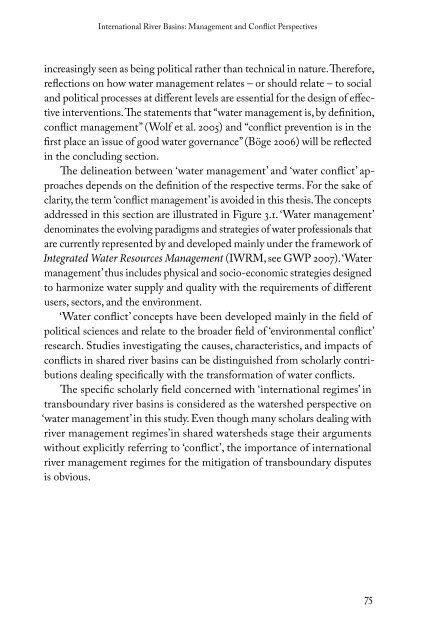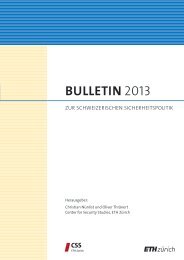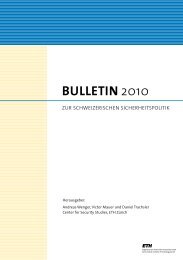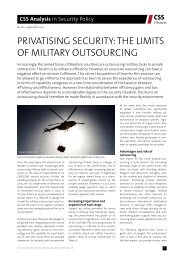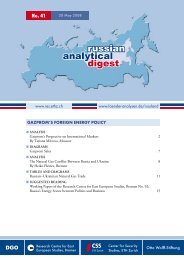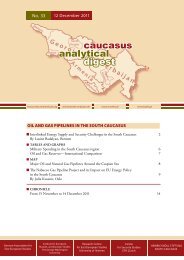Double-Edged Hydropolitics on the Nile - Center for Security Studies ...
Double-Edged Hydropolitics on the Nile - Center for Security Studies ...
Double-Edged Hydropolitics on the Nile - Center for Security Studies ...
You also want an ePaper? Increase the reach of your titles
YUMPU automatically turns print PDFs into web optimized ePapers that Google loves.
Internati<strong>on</strong>al River Basins: Management and C<strong>on</strong>flict Perspectives<br />
increasingly seen as being political ra<strong>the</strong>r than technical in nature. There<strong>for</strong>e,<br />
reflecti<strong>on</strong>s <strong>on</strong> how water management relates – or should relate – to social<br />
and political processes at different levels are essential <strong>for</strong> <strong>the</strong> design of effective<br />
interventi<strong>on</strong>s. The statements that “water management is, by definiti<strong>on</strong>,<br />
c<strong>on</strong>flict management” (Wolf et al. 2005) and “c<strong>on</strong>flict preventi<strong>on</strong> is in <strong>the</strong><br />
first place an issue of good water governance” (Böge 2006) will be reflected<br />
in <strong>the</strong> c<strong>on</strong>cluding secti<strong>on</strong>.<br />
The delineati<strong>on</strong> between ‘water management’ and ‘water c<strong>on</strong>flict’ approaches<br />
depends <strong>on</strong> <strong>the</strong> definiti<strong>on</strong> of <strong>the</strong> respective terms. For <strong>the</strong> sake of<br />
clarity, <strong>the</strong> term ‘c<strong>on</strong>flict management’ is avoided in this <strong>the</strong>sis. The c<strong>on</strong>cepts<br />
addressed in this secti<strong>on</strong> are illustrated in Figure 3.1. ‘Water management’<br />
denominates <strong>the</strong> evolving paradigms and strategies of water professi<strong>on</strong>als that<br />
are currently represented by and developed mainly under <strong>the</strong> framework of<br />
Integrated Water Resources Management (IWRM, see GWP 2007). ‘Water<br />
management’ thus includes physical and socio-ec<strong>on</strong>omic strategies designed<br />
to harm<strong>on</strong>ize water supply and quality with <strong>the</strong> requirements of different<br />
users, sectors, and <strong>the</strong> envir<strong>on</strong>ment.<br />
‘Water c<strong>on</strong>flict’ c<strong>on</strong>cepts have been developed mainly in <strong>the</strong> field of<br />
political sciences and relate to <strong>the</strong> broader field of ‘envir<strong>on</strong>mental c<strong>on</strong>flict’<br />
research. <strong>Studies</strong> investigating <strong>the</strong> causes, characteristics, and impacts of<br />
c<strong>on</strong>flicts in shared river basins can be distinguished from scholarly c<strong>on</strong>tributi<strong>on</strong>s<br />
dealing specifically with <strong>the</strong> trans<strong>for</strong>mati<strong>on</strong> of water c<strong>on</strong>flicts.<br />
The specific scholarly field c<strong>on</strong>cerned with ‘internati<strong>on</strong>al regimes’ in<br />
transboundary river basins is c<strong>on</strong>sidered as <strong>the</strong> watershed perspective <strong>on</strong><br />
‘water management’ in this study. Even though many scholars dealing with<br />
river management regimes’in shared watersheds stage <strong>the</strong>ir arguments<br />
without explicitly referring to ‘c<strong>on</strong>flict’, <strong>the</strong> importance of internati<strong>on</strong>al<br />
river management regimes <strong>for</strong> <strong>the</strong> mitigati<strong>on</strong> of transboundary disputes<br />
is obvious.<br />
75


